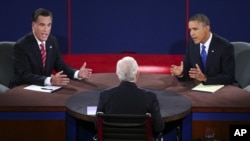CAIRO —
U.S. presidential candidates Barack Obama and Mitt Romney have traded sharp barbs about their approaches to foreign policy, in particular dealings with the Middle East. But many in the region see little prospect of change whoever wins.
People across the Middle East have been roiled by political change for nearly two years, So it's perhaps not surprising the U.S. presidential election is failing to garner much interest.
Few are expressing a preference for either President Barack Obama or challenger Mitt Romney, even as both make the Middle East a key foreign policy issue.
Romney sees a region in chaos.
“We're talking about the Middle East and how to help the Middle East reject the kind of terrorism we're seeing and the rising tide of tumult and confusion,” he said.
For some in the Arab world, any talk of “help” from any U.S. politician comes across as arrogant.
“It's as if it's a teacher holding a stick to the student - as if Arabs are students in a classroom in front of him. This is all I see from America,” said Ayman Kamal, a store clerk in Cairo.
Others fear continued U.S. military interference in the region, despite calls for caution from President Obama.
“For us to get more entangled militarily in Syria is a serious step," Obama noted.
“We don't want to have military involvement there," Romney said. "We don't want to get drawn into a military conflict.”
Author and political scientist Hassan Nafaa says it doesn't matter who wins.
“Because it doesn't make any difference whether we have Obama or Romney. But the intellectuals, certainly, would prefer Obama," he opined, "rather than Romney because he will be more careful in using force to achieve the U.S. goals and interests.”
Obama raised high hopes in 2009, promising a fresh start for the U.S. in the Middle East during a speech in Cairo. But disappointment followed, as did the Arab Spring. Agathon Shehata is a Coptic priest
“Obama's policies were not what we much expected. I can't say more, just we didn't expect them to be like that,” the priest said.
For Hassan Nafaa, the biggest disappointment was no change in U.S. policy on the Arab-Israeli conflict.
“Everybody knows the United States, whoever is governing this big important international actor, will be very much supportive to Israel," he said. "So, as long as the U.S. president doesn't change the current American policy in the Middle East, we will see the United States as playing a negative role in this part of the world and nothing will be changed.
Both candidates have pledged full backing of America's long-time ally and that continued support is a perennial rallying cry for anti-Americanism in the region.
People across the Middle East have been roiled by political change for nearly two years, So it's perhaps not surprising the U.S. presidential election is failing to garner much interest.
Few are expressing a preference for either President Barack Obama or challenger Mitt Romney, even as both make the Middle East a key foreign policy issue.
Romney sees a region in chaos.
“We're talking about the Middle East and how to help the Middle East reject the kind of terrorism we're seeing and the rising tide of tumult and confusion,” he said.
For some in the Arab world, any talk of “help” from any U.S. politician comes across as arrogant.
“It's as if it's a teacher holding a stick to the student - as if Arabs are students in a classroom in front of him. This is all I see from America,” said Ayman Kamal, a store clerk in Cairo.
Others fear continued U.S. military interference in the region, despite calls for caution from President Obama.
“For us to get more entangled militarily in Syria is a serious step," Obama noted.
“We don't want to have military involvement there," Romney said. "We don't want to get drawn into a military conflict.”
Author and political scientist Hassan Nafaa says it doesn't matter who wins.
“Because it doesn't make any difference whether we have Obama or Romney. But the intellectuals, certainly, would prefer Obama," he opined, "rather than Romney because he will be more careful in using force to achieve the U.S. goals and interests.”
Obama raised high hopes in 2009, promising a fresh start for the U.S. in the Middle East during a speech in Cairo. But disappointment followed, as did the Arab Spring. Agathon Shehata is a Coptic priest
“Obama's policies were not what we much expected. I can't say more, just we didn't expect them to be like that,” the priest said.
For Hassan Nafaa, the biggest disappointment was no change in U.S. policy on the Arab-Israeli conflict.
“Everybody knows the United States, whoever is governing this big important international actor, will be very much supportive to Israel," he said. "So, as long as the U.S. president doesn't change the current American policy in the Middle East, we will see the United States as playing a negative role in this part of the world and nothing will be changed.
Both candidates have pledged full backing of America's long-time ally and that continued support is a perennial rallying cry for anti-Americanism in the region.




